By the time he got to Lisey’s Story, King had written himself into a dead end. His Dark Tower series was finished. He had been in so much pain from his accident that he announced his retirement in 2002 and his books since then felt increasingly exhausted. From a Buick 8 was about the limitations of fiction, and The Colorado Kid was about the failure of stories to actually solve anything. Cell was a dark book about the old world dying, and a new world of constant struggle being born that destroyed everything King found worthwhile — from schools to language.
He was also physically exhausted. The 1999 van accident had caused previously undetected damage to his right lung that turned into walking pneumonia in mid-November, 2003. Nevertheless, he attended the National Book Awards on Nov. 19, 2003 to receive his Medal for Distinguished Contribution to American Letters and gave a big, combative, rousing speech, begging the jurors of the National Book Awards to include more popular fiction in their nominations (a plea they ignored, judging by subsequent NBA shortlists). A lot of words were typed about King’s National Book Award speech, some folks finding his comments defensive, others finding them offensive, but no one mentioned how much of his speech had been about Tabitha King, his wife. Over half the speech is about how the award belongs to her because her love and dedication allowed him to write, and how she was there when he was poor and without prospects, and she was still there when he’s got an award around his neck and the world at his feet.
No one much commented, either, on how four days later King was hospitalized for pneumonia, and underwent surgery to remove scar tissue and fluid from his lung. During his week in the hospital, Tabitha redecorated his writing studio. When he came home, she still wasn’t finished, and the door was closed. “I wouldn’t go in there,” she told him. “It’s disturbing.” He went in there. All his books and papers were packed, the shelves were bare. Having cleaned out his mom’s house after her death, he realized that this is what it would look like when he died and his wife had to do that final cleaning. The speech, the pneumonia, the dead office, all combined to become Lisey’s Story, finally published in October, 2006. But actually, its origins go back all the way to 1968.
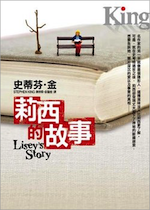 Originally intended to be a comedy about the wife of a famous author who’s the secret to his success, constantly bailing him out behind the scenes but never receiving any of the credit, Lisey’s Story got dark, fast. Instead of unfolding in a series of incidents where National Book Award and Pulitzer Prize winning author Scott Landon has to have his fat pulled out of the fire by Lisey, his wife, the book revolves around one incident: the 1988 shooting and near-death of Scott Landon at a routine ground breaking for a school library. Landon’s invited to say a few words and scoop out the first chunk of dirt with a ceremonial silver shovel, while Lisey hovers in the background getting patronized and belittled by the hosts who immediately dismiss the unemployed wife of a famous literary figure as a bit of fluff. But when a disturbed student named Gerd Allan Cole shoots Scott in the chest, it’s Lisey who saves the day with one swing of the ceremonial shovel.
Originally intended to be a comedy about the wife of a famous author who’s the secret to his success, constantly bailing him out behind the scenes but never receiving any of the credit, Lisey’s Story got dark, fast. Instead of unfolding in a series of incidents where National Book Award and Pulitzer Prize winning author Scott Landon has to have his fat pulled out of the fire by Lisey, his wife, the book revolves around one incident: the 1988 shooting and near-death of Scott Landon at a routine ground breaking for a school library. Landon’s invited to say a few words and scoop out the first chunk of dirt with a ceremonial silver shovel, while Lisey hovers in the background getting patronized and belittled by the hosts who immediately dismiss the unemployed wife of a famous literary figure as a bit of fluff. But when a disturbed student named Gerd Allan Cole shoots Scott in the chest, it’s Lisey who saves the day with one swing of the ceremonial shovel.
Years later she’s thinking back on the incident because she found a newspaper clipping about it as she’s cleaning out her dead husband’s office, a task she’s put off for two years. Academics, fans, and book collectors circle her like vultures, badgering her to donate Scott’s papers to one library or another, to let them paw through his papers for unpublished work, to pick over his corpse one last time. Lisey resists until one of the academics (the unfortunately named Joseph Woodbody) hires a psycho calling himself Zack McCool to scare her into donating the papers to the University of Pittsburgh, or else. So that’s Lisey’s Story, right? It’s a book about a psycho stalking a woman still mourning her dead, famous husband. Except, it’s also a novel about the relationship between Lisey and her three sisters, Amanda (whose mental issues cause her to withdraw into catatonia), Cantata, and Darla. And it’s also a book about a magical secondary world called Boo’ya Moon. And it’s also a book about child abuse. Also, in case that wasn’t enough, it’s a book about insanity. And, finally, it’s a book about the wellspring of creativity that exists in the center of the world. Like a bachelor’s casserole, it’s kind of a got a little bit of everything from the fridge in it.
 Ever since Ben Mears in ’Salem’s Lot, King has written about writers who both come up with crap titles (Air Dancing, Coster’s Daughter, Fast Cars) and who destroy the lives of the people around them. Things have gotten a bit more subtle since Jack Torrance chased his wife around the Overlook Hotel with a croquet mallet, but Lisey’s life is still bent all out of shape by her husband’s struggle to avoid his family history of insanity. He’s mutilated himself a few times, and he’s given to somewhat cruel practical jokes, but she’s always been there to pick up the pieces and bring him back to earth. Now that he’s dead he’s left a series of clues for her to follow that will allow her to save herself from Zack McCool by journeying into Scott’s past and figuring out how to travel to the make believe land he can magically transport himself to called Boo’ya Moon.
Ever since Ben Mears in ’Salem’s Lot, King has written about writers who both come up with crap titles (Air Dancing, Coster’s Daughter, Fast Cars) and who destroy the lives of the people around them. Things have gotten a bit more subtle since Jack Torrance chased his wife around the Overlook Hotel with a croquet mallet, but Lisey’s life is still bent all out of shape by her husband’s struggle to avoid his family history of insanity. He’s mutilated himself a few times, and he’s given to somewhat cruel practical jokes, but she’s always been there to pick up the pieces and bring him back to earth. Now that he’s dead he’s left a series of clues for her to follow that will allow her to save herself from Zack McCool by journeying into Scott’s past and figuring out how to travel to the make believe land he can magically transport himself to called Boo’ya Moon.
King has said that he and Tabitha aren’t models for Scott and Lisey but he’s pulling so many details from his life (a handcranked printing press in his childhood basement, chewing aspirin, writing to high decibel rock) and his other books (a private cemetery out of Pet Sematary, the Overlook-esque Antlers Hotel, a killer fan out of Misery, laughter as a weapon as in It, the Long Boy who bears a striking resemblance to Pet Sematary’s Wendigo) that it’s hard for this not to feel like a personal statement. Lisey’s Story is written in a high blown state of hysteria and agitation. It’s not a meditation on death and marriage, it’s an AC/DC album about death and marriage. King can’t relax about anything. He wants to write about the secret language couples develop between them and then he hammers that point home over and over again for the hard of hearing, which becomes the book’s most off-putting characteristic. King has always liked to make up words, from the ka-tets and bah-bos of the Dark Tower books to the Rasts! and Gooms! of Cell, but here he’s really going for it. The invented language that Lisey and Scott speak is a cloying baby talk full of awkward phrases (“Strap on whenever it seems appropriate, babyluv’) and infantile profanities, “shutupsky”, “bad-gunky”, and the worst offender of all “smucking” which appears, quite literally, on every other page.
 King often fixates on a phrase that will bubble through his books, like “Full Dark” that first appeared, I believe in 2006’s Cell, then again in Duma Key before becoming the title of his 2010 short story collection, Full Dark, No Stars. But his use of words like “boogery” from book to book can start to seem annoying because of how awkwardly they sit in your mouth, and the the “smucks” and “smuckings” of Lisey’s Story are like wooden bats hitting you in the eyes. Even a last minute explanation of its origin does less to endear the word to the reader, than to serve as one more iteration of an annoying stylistic tic. Which isn’t to say this is a bad book. King fully inhabits Lisey’s skull, and she comes alive on the page the way Dolores Claiborne and Carrie White did in their self-titled books. Even better, way back in 1968, King’s writing workshop teacher, Burton Hatlen, taught him that there is a common pool in the center of our culture’s mental landscape and it’s from this pool that everyone gets their ideas. King literalizes this idea, making the pool the main feature of Boo’ya Moon, a pocket universe you can only travel to if you can visualize its imaginary landscape fully and completely, the same way a writer has to imagine his fictional settings into being. King not only manages to give our collective unconscious a physical landscape, but he also uses it as the setting for a beat-the-clock ending drenched in good old supernatural suspense. Weirdly, the book’s biggest deficiency is its baddies, Zack McCool and Joseph Woodbody. King had sympathy for Annie Wilkes in Misery despite how monstrous she became, but he has none for Woodbury and McCool and they never evolve much beyond a stock sniveling academic Snidely Whiplash and one of King’s evil Southern shitkickers, which is too bad since, although the book is about so much more than their plot to steal Scott’s papers, ultimately they are the core around which its action revolves.
King often fixates on a phrase that will bubble through his books, like “Full Dark” that first appeared, I believe in 2006’s Cell, then again in Duma Key before becoming the title of his 2010 short story collection, Full Dark, No Stars. But his use of words like “boogery” from book to book can start to seem annoying because of how awkwardly they sit in your mouth, and the the “smucks” and “smuckings” of Lisey’s Story are like wooden bats hitting you in the eyes. Even a last minute explanation of its origin does less to endear the word to the reader, than to serve as one more iteration of an annoying stylistic tic. Which isn’t to say this is a bad book. King fully inhabits Lisey’s skull, and she comes alive on the page the way Dolores Claiborne and Carrie White did in their self-titled books. Even better, way back in 1968, King’s writing workshop teacher, Burton Hatlen, taught him that there is a common pool in the center of our culture’s mental landscape and it’s from this pool that everyone gets their ideas. King literalizes this idea, making the pool the main feature of Boo’ya Moon, a pocket universe you can only travel to if you can visualize its imaginary landscape fully and completely, the same way a writer has to imagine his fictional settings into being. King not only manages to give our collective unconscious a physical landscape, but he also uses it as the setting for a beat-the-clock ending drenched in good old supernatural suspense. Weirdly, the book’s biggest deficiency is its baddies, Zack McCool and Joseph Woodbody. King had sympathy for Annie Wilkes in Misery despite how monstrous she became, but he has none for Woodbury and McCool and they never evolve much beyond a stock sniveling academic Snidely Whiplash and one of King’s evil Southern shitkickers, which is too bad since, although the book is about so much more than their plot to steal Scott’s papers, ultimately they are the core around which its action revolves.
Lisey’s Story took a little over two years to write and it came out ten months after Cell. With big aspirations, a huge wordcount (528 pages to Cell’s 350), and King’s National Book Award behind it, Scribner pushed Lisey hard, printing 1.1 million copies and distributing 7,000 ARCs, the most they’d sent out since they first acquired King with Bag of Bones all the way back in 1998 (for which they’d printed 1.2 million books). They also pushed independent bookstores hard to carry the novel, since they detected some softness in that market for King’s fiction. King even agreed to do a publicity tour for the book, which is normally something he hates. Nevertheless, the book refused to break out of the pattern that had been set with From a Buick 8. Sales leveled off at about 1.2 million copies, and it debuted at number one on the New York Times bestseller list, falling off after the now-standard 10 weeks. That’s nothing to sneeze at, but it’s a far cry from the days of Gerald’s Game (1992) when King’s time on the list averaged 30 weeks.
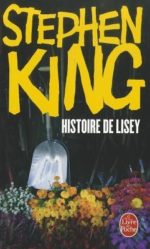 Lisey delivers a big, fat, epic story, and King fully inhabits it, but it’s his most mannered and self-conscious book, written in a kind of overheated style that reminds me of Gerald’s Game, Dolores Claiborne, and Rose Madder. It’s a thunderflash of a book, a storm of invented language, internal monologues, shifting fonts, dark secrets, true love, meditations on marriage and mortality, violence, and trumpet blasts of surreal incident. King’s blowing everything he knows about life and love onto the page, veering from the grotesque to the sentimental but mostly hugging the sweet spot in the middle of the lane. And yet, despite the fact that he asked Scribner editor-in-chief Nan Graham to edit it instead of his usual editor, Chuck Verrill, in order to make sure that Lisey’s voice came across as authentically female, it’s a big, loud, and ultimately very male book, full of fury and flash. Think of a Valentine from a guilty lover, who insists on sending four hundred roses when a dozen would do. And as for the intended recipient of this love letter, Tabitha King?
Lisey delivers a big, fat, epic story, and King fully inhabits it, but it’s his most mannered and self-conscious book, written in a kind of overheated style that reminds me of Gerald’s Game, Dolores Claiborne, and Rose Madder. It’s a thunderflash of a book, a storm of invented language, internal monologues, shifting fonts, dark secrets, true love, meditations on marriage and mortality, violence, and trumpet blasts of surreal incident. King’s blowing everything he knows about life and love onto the page, veering from the grotesque to the sentimental but mostly hugging the sweet spot in the middle of the lane. And yet, despite the fact that he asked Scribner editor-in-chief Nan Graham to edit it instead of his usual editor, Chuck Verrill, in order to make sure that Lisey’s voice came across as authentically female, it’s a big, loud, and ultimately very male book, full of fury and flash. Think of a Valentine from a guilty lover, who insists on sending four hundred roses when a dozen would do. And as for the intended recipient of this love letter, Tabitha King?
“I don’t think she’s real crazy about this book, to tell you the truth,” King said.
 Grady Hendrix has written for publications ranging from Playboy to World Literature Today; his previous novel was Horrorstör, about a haunted IKEA, and his latest novel, My Best Friend’s Exorcism, is basically Beaches meets The Exorcist.
Grady Hendrix has written for publications ranging from Playboy to World Literature Today; his previous novel was Horrorstör, about a haunted IKEA, and his latest novel, My Best Friend’s Exorcism, is basically Beaches meets The Exorcist.


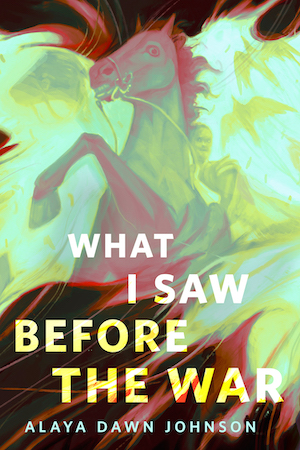
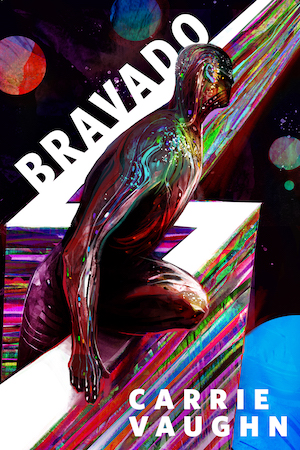






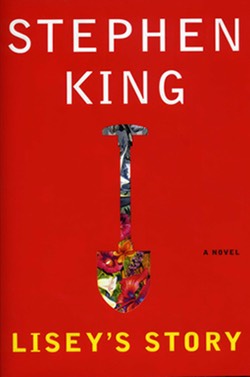
Grady, I can’t even tell you how glad I am that you’re plunging back into King’s library! I enjoy some of your Rereads even more than the novels themselves. Lisey’s Story is one of the King novels I’ve been curious about but never got around to reading. Maybe now I’ll give it a try and find out what the smuck the smucking fuss is all about.
Anyway, welcome back!
Man, Grady — it is so good to see you back here wrapping up all the Stephen King books — those I’ve read and those I haven’t. Looking forward to more!
Grady, than you for your re-reads; I always enjoy them and I’m glad the series is up and running again! :)
I have to say that I kind of disagree with you regarding “Lisey’s Story.” I remember when I first read it, I thought, “FINALLY King has written a main female character well.” I have problems with Carrie White, Jessie Burlingame, Rose (of “Rose Madder”) as well as Dolores Claiborne, most of which are too long and boring to explain. Don’t even get me started on King’s secondary female characters, like Frannie from “The Stand” and Beverly from “It.” Pretty much all I can say is that they read like women written by a very intelligent, observant man who was *sympathetic* to women but who didn’t really understand the *experience* of being a woman. In “Lisey’s Story,” I felt King really understood Lisey, from her helpless (hopeless?) love for Scott to her relationship with her sisters. BTW, I also felt that King did a better job than usual of depicting mental illness with Amanda, IMHO.
I definitely agree that some of the repetitions become tiresome (yeah, at this stage in his career King really seemed to be into “incantational” repetitions) and the cutesy slang is not the best. However, I have to wonder if, to some extent, the “secret language” Scott and Lisey share isn’t partially derived from regional New England dialect. I grew up in New England not all THAT long ago, and from what I remember, a number of people I knew (even adults) went to some lengths to avoid swearing. Maybe it’s a holdover from Puritan days – I don’t know. So I wonder if “smuck” et. al. aren’t actually terms King actually heard from friends and neighbours.
I DO think that Woodbody and “Zack” are a little too transparently King taking out his anger at the literary establishment and the “cult of personality” that surrounds famous writers, both living and dead. True story: when I was in grad school for English in NYC, my professor of Modern Poetry gave me an assignment to go see the Ted Hughes and Sylvia Plath papers that were at that time on exhibit in the city and to give a presentation on my “field trip” to the class (also knowing that I am a big Plath fan). At this point I need to add that my personal style then and now tends to be kind of “goth” – I’ve got a bunch of piercings and tattoos and almost always dress in black. I went to the exhibit and, once there, asked the curator some questions about it. She replied in unfriendly monosyllables. At some point I mentioned I was from the Graduate Center and doing a report for my class. Once I said that, the curator immediately become MUCH more friendly and helpful. Apparently since the exhibit opened, she and the other staff had to deal with an incredible amount of Plath “groupies” who showed up, all dressed in black (thus, she thought I was one of them), and who tried to burn candles and leave flowers before the exhibits. The curator also told me these Plath fans would also make outrageous demands to hold the original manuscripts, try to smash the glass cases, and sometimes just burst into tears. Some of them supposedly had to be dragged out. SF writer Harlan Ellison has a bunch of stories about far-too-devoted fans and, IIRC, he once published an article including the experiences of several other genre writers, one of whom had a fan throw a cup of fresh vomit at them. While this isn’t a subtle move on King’s part, I can sympathize with his anger. I also wonder how much his wife had to deal with in terms of aggressive academics and fans when he was close to death after being hit by that van in 1999.
I think it is kind of k!ck@@@@@$$ of Tabitha King to say she doesn’t really like “Lisey’s Story” and, from what King says in the rest of the interview (I followed the link) to mostly stay silent about it. I’m not personally acquainted with any of the Kings. However, I think the authenticity of Lisey’s character probably came from Tabitha King – in the introduction or afterword (sorry, can’t remember which – I haven’t got a copy of the book to hand), King says the relationship between the three sisters was inspired by watching Tabitha King’s interactions with her own sisters. However, if this book is a love letter, it’s maybe one with a cutting edge. Tabitha King is a talented writer and an accomplished novelist. Yet, will anyone know her as anyone else than “Stephen King’s wife who also writes,” both during her lifetime and after her death?
Oooh, I’ve been thinking about rereading Lisey’s Story so may have to join along. It was the first King I’d read as an adult (I glutted on early King as a teen and never enjoyed his stuff). My wife is a devoted King fan, and she was right about Lisey’s Story. I was gripped (altho the critiques you list echo my own).
“Smucking”. That was the word that helped make this book the only book of King’s that I haven’t finished, and the last time I automatically bought the book because it was King. The only two going forward from this have been “Under the Dome” and “11/22/63”, which I would place in his Top 5 best.
But this book! Nothing happens slowly. The shooting incident seems to take 20 pages to get to the point of the shooting incident, and I just didn’t find anyone or anything remotely interesting or enjoyable. Like I said, I own this, so I should try it again, but if one more smucking dull chapter smucking happens smucking again…..!!!!
I love ‘Lisey’s Story’. It is so authentic, beautiful; not to mention psychologically invasive almost; delving into the ugliness if humanity. It is a story that reaches into the depths of the relationship between a couple whose love spands beyond death; as though Scott still lives within Lisey. It doesn’t dance around death. It faces it head on; lays it bare touching the frightening finality of death, the substance of our deepest fears and nightmares. I have not finished the novel, but I don’t want it to end. I want to live on this other plane where Scott seems to exist; where you can almost reach in and touch the fabric of the past. We long for the people that we love and that we have lost. I have been looking at my meagre possessions. The memories of my life that mean nothing to anyone but me. Should I pack it up so no one has to deal with it when I die? More than anything, I wanted to express that King has an essentially beautiful and deep mind. King will continue to live through his work long after he is gone.With all due respect to Tabitha, one could fall in love with the man through his novels. Fall in love with his mind. King is truly prolific. God I wish I could write like that. I want to publish one day, maybe King might read my work (yeah right). Anyway, these smucking people that criticise ‘Liseys Story’ need to go back and read it with an open mind. King’s mind can be scary, sometimes we need to face the horrible depths of human nature. King explores these dark corners in an amazing and creative manner that I find incredibly emotive and compelling. The strong and feminine character of Lisey is incredibly beautiful and compassionate. Love the craft of King’s work. Absolutely blows my mind.
This book really grew on me, at first it was hard to get into. I really liked the scenes in Boo’ya and thinking about the pool. Feel like we got a good glimpse inside King’s mind. I am going to try to access the pool myself, hope I don’t run into the Long Boy!
I do not agree with this review at all, which shouldn’t be a big deal right? Everyone has an opinion..but for some reason this one really bothered me, enough so that I am leaving this comment. Lisey’s Story was “smucking” amazing. Period. I have read everything he has written and this is one of my most favorite, and that’s saying something. It touches something in you and harkins back to childhood imagination then and now. And the secret language between the two was amazing as well…this book brought forth so many strong emotions. Bad reviews for this book?…get the smuck out of here! Lol